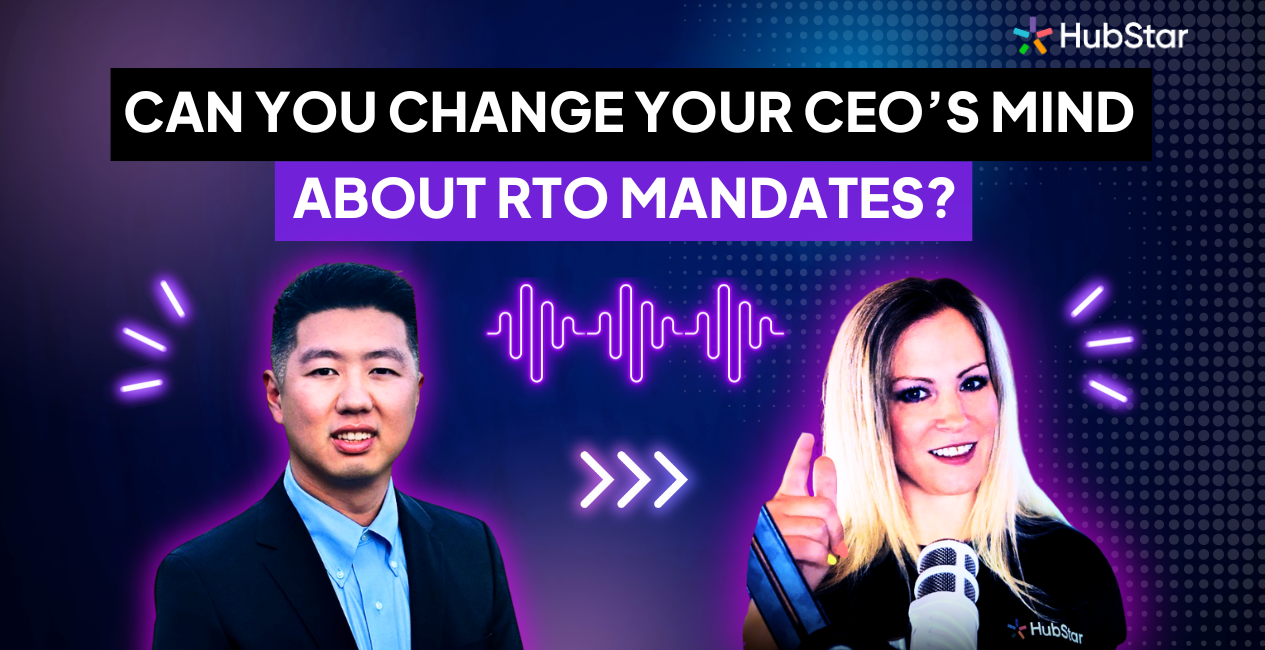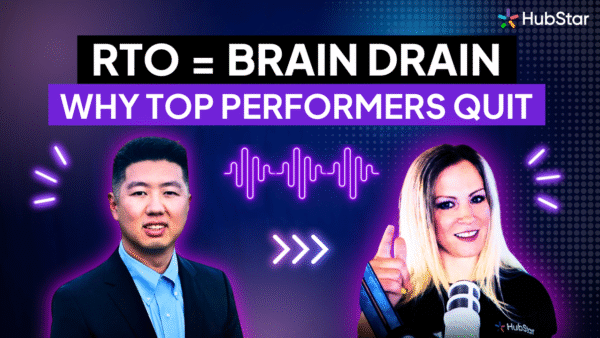Can You Change Your CEO’s Mind About RTO Mandates?
In this excerpt from episode 5 of Workplace Visionaries, Jane chats with University of Pittsburgh research professor Mark Ma about generational views of the purpose of the office, whether it's even worth trying to change a CEO's mind pre RTO mandate, and how hybrid work might be changing family dynamics and society for the better.

What happens when Gen Z wants to come into the office for mentorship, but the mentors would rather be working from home?
How can individual workplace leaders go against the grain of an RTO mandate they know won’t work?
How can organizations figure out which hybrid policy is best for them?
This blog covers just a fraction of the workplace wisdom Mark Ma spills on Workplace Visionaries. Watch and listen to the full episode on 📺YouTube, 🎧Spotify and 🍎Apple Podcasts.
"The big question is whether working from home actually helps address some of the burnout and mental health issues."
Mark Ma
Jane Young:
In terms of stages of life, younger people are more likely to use the office because they don’t have families yet, or they might share houses with other people and so working from home is not so practical. If there’s more young people wanting to use the office and less people at a later life stage who are more experienced, how have you seen companies handling mentoring?
Mark Ma:
That’s a big issue about mentoring. At least one company tried to do virtual remote onboarding and suggested that they have done that very successfully. But more companies do in-person trainings and in-person onboarding. I think since these young employees want to go back to office, what they can do is assign some mentors to those young workers, and make sure that these mentors are compensated so they have the incentive to do that.
"Since these young employees want to go back to office, what they can do is assign some mentors to those young workers, and make sure that these mentors are compensated so they have the incentive to do that."
Mark Ma
And also, make sure that these mentors are reachable either online or in person. You could pay them to go to the office if they are willing to, or you make sure that they are reachable somehow online so that the young workers could ask them questions. I think that’s a very important issue that since these young workers still want to go to the office, you could actually let them go and then provide in-person training to them at the early stage.
Jane:
Yeah, that makes sense. And you know, there’s probably quite a few of our listeners that might be in a situation where they’re senior workplace leaders, but they don’t necessarily have control over things like policy decisions or how you approach mentoring or how you approach who should be in the office and when.
What advice would you have for those people in terms of driving positive change and trying to be a change maker in their organization even though they maybe can’t directly make the decision themselves about these things?
Mark:
That’s a very real situation because most of these RTO decisions are made by the CEO. Even in some situations, like I saw in at least one firm—Walmart—the CTO resigned over it. So it’s not even among the C-suite executive team they agree on these issues. It’s really the CEO wants to impose this top-down decision. I can see that a lot of HR executives or workplace executives, they want to gain more flexibility, but the CEO doesn’t want to do that. I totally can see that happening. And I think in that situation, maybe something maybe helpful is just give examples of people—of companies—who have done that successfully.
Good examples include NVIDIA and also Dropbox. Dropbox is also doing that very successfully, and NVIDIA clearly, stock price is still doing very well even though they don’t require anyone to go to office for a minimum number of days. Still, I’m not sure a lot of CEOs really listen to other advice. So in those situations, there’s not much you can do. But the hope is there because there are actually surveys showing that the younger generation of CEOs are more open-minded and more receptive of allowing people working remotely. So I think gradually over time, when the younger generation of management—top management—takes over, they will become more open-minded. And maybe they already have the experience of working from home when they are young, so they have a better understanding of the benefits and how to do that. So I think it will take time, and when the younger generation of managers takes over, it will be much easier.
"Run your own experiment inside your company. Randomly assign some workers with a policy that requires them to go to office, and some other workers don't need to go to the office, or they can make the choice by themselves. And then compare their performance, compare their retention rates and compare their job satisfaction over a 3 to 6 month period.
Mark Ma
Jane:
Yeah, you can’t necessarily change the very entrenched worldview, although I suppose there’ll be some leaders possibly on the fence that can be influenced by data and case studies and possibly pilots I guess as well.
Mark:
One suggestion I’ve been making to a lot of executives is run your own experiment inside your company. Randomly assign some workers with a policy that requires them to go to office, and some other workers don’t need to go to the office, or they can make the choice by themselves. And then compare their performance, compare their retention rates and compare their job satisfaction over a 3 to 6 month period. And if you find that asking people to go back to office does not hurt anything, then you probably want to make that decision. So run an experiment. And I always tell those executives that I’m happy to do the design and help them run the pilot.
Watch now

Jane:
Well, if anybody’s listening, what a fantastic offer. I think that is a wonderful thing, and I would like to think there’d be a lot of people listening who might be in an organization where rather than trying to support an entrenched view that’s not necessarily beneficial, you could just really find out what the deal is for real.
Mark:
I also want to better understand and provide more evidence on this. So I’d be happy to do the design, to help implement the experiments for the organizations.
Jane:
Are there other things that you want to study? So that’s the mandate impact. I guess correlations with financial performance could be up your street. What sort of things are you interested in and looking at and curious about?
Mark:
I think there are a lot of important issues we haven’t looked at yet. And if I could run some experiments, I would look at these issues first: there’s a big mental health crisis among the workers all around the world. All these workers are feeling stressed after the pandemic, and that has not been addressed until today.
A lot of workers are still asking for mental health leaves. Everyone is talking about this quiet quitting issue. People feel burnt out, feel stressed out, and that hurts their productivity.
So the big question is whether working from home actually helps address some of the burnout and mental health issues.
Another big question is what happens to society and families. That’s very important. When women can work from home, they get a job and they can take care of their children or take care of their family at the same time. The dynamics inside families change, and when women have income, it’s true that there’s less of a domestic imbalance. The family’s relationship becomes better, and because of this income, and because of the time parents spend with their children, their children could have a better future as well. If you spend more time interacting with your children, you have a better understanding of what happens on at school. That’s very important for the parents, rather than just coming back home after work and after your child’s gone to bed. That’s very important for the future of the children, and rather the child will do better in school and whether they’ll have better academic performance, I think all of these are very important questions.
What's the long-term impact of hybrid work on society and families?
Keep watching to find out, plus more on why top performers are the first to quit after an RTO mandate, the abysmal state of manager training and how AI is going to reshape the purpose of work.

Share this post


















